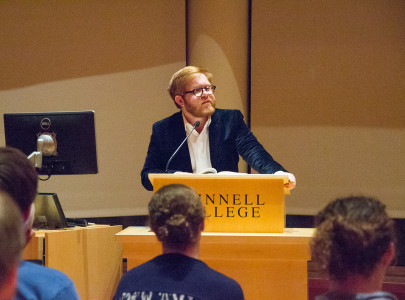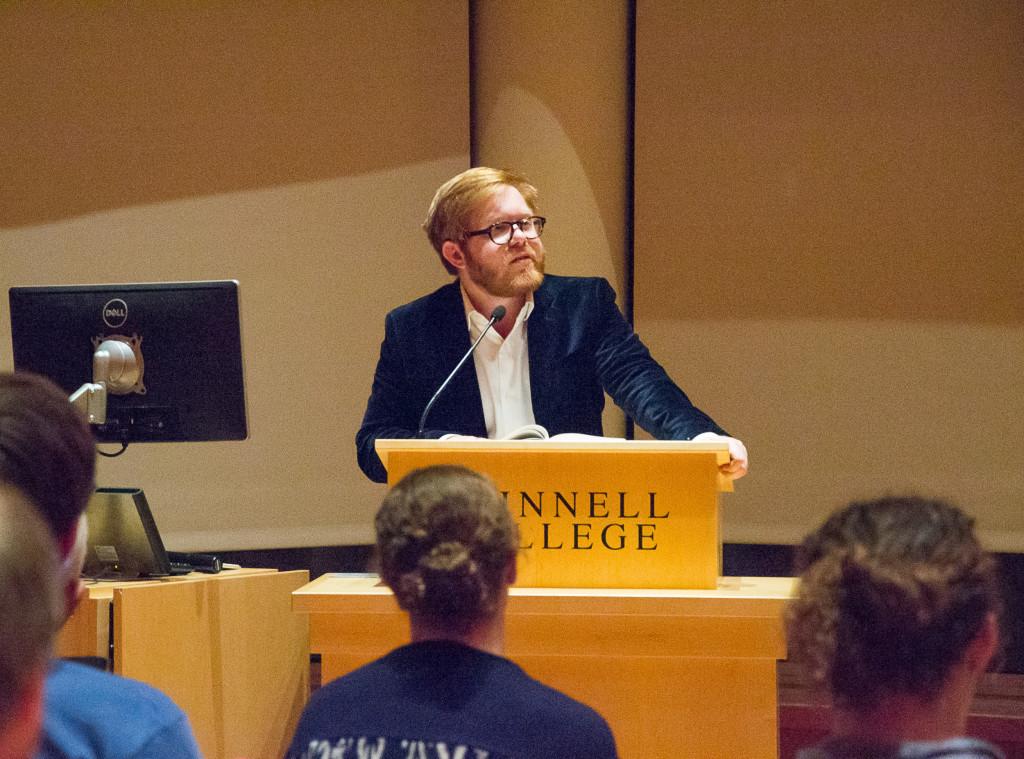
Michael Cummings, Community Editor
cummings@grinnell.edu
“I know you all love fracking because it sounds like another favorite f-word of ours,” said Taylor Brorby, an MFA student in Creative Writing and Environment at Iowa State University, to a room of Grinnellians celebrating Earth Week. Brorby introduced three other authors and an editor of his recently published anthology, entitled “Fracture: Essays, Poems, and Stories on Fracking in America,” as part of a panel event hosted by the Center for Prairie Studies and the Environmental Studies Department in JRC 101 on Tuesday night.
Fracking, the process of using a combination of drilling and flooding to fracture shale miles below the earth’s surface to extract fossil fuels, has been criticized for the harm it does to the environment. Here in Iowa, many people oppose the Bakken oil pipeline which would carry oil from fracking in North Dakota through the state.
In reaction to this and other issues related to fracking, Brorby put together “Fracture” to gather a variety of voices expressing their thoughts and concerns on the issue.
“What would Bakken mean for the natural and social environments of Iowa and the Midwest, and what does fracking mean for us all?” asked Professor Jonathan
Andelson, Anthropology, the Director of the Center for Prairie Studies. “Taylor Brorby set himself the task of collecting answers to those questions from people around the United States.”
Brorby began by reading the preface to the book, a short story entitled “Fracking: A Fable” by Barbara Hurd. The story, written in prose reminiscent of a fantasy novel, tells the history of the formation of oil deposits and their violent extraction from the Earth by humans.
To finish off the event, Brorby introduced the final speaker of the night, Debra Marquart, Professor of English at Iowa State University. Marquart spoke on some of her first-hand experience seeing the oil boom in North Dakota.
“In September of 2013 a Tesoro pipeline broke outside of Tioga, North Dakota, and 865,200 gallons of Bakken crude were emptied into a farmer’s field,” Marquart said. “In January of 2015 … I met the woman, Patty Jensen, whose farm that was, and she told me they were still cleaning that 30 acres of land. It will never, ever be the same.”
To conclude the talk, Brorby read another piece from the book, one entitled “Hear No Evil” by Stefanie Brook Trout. The essay used the refrain “We don’t want to hear about fracking” to make a satirical point about society’s continued and willful ignorance about the issues it causes. In one part of Trout’s piece, she warns, “Fracking is the future. As long as it’s not in our backyard. In fact, why not do it somewhere we’ve already written off? Like North Dakota. Hell, it might even make the place a little better.”
























































